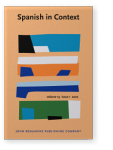¿A poco así dices? Biased interrogatives with ¿A poco (no)…? in Mexican Spanish
This article offers a characterization of the biased polar interrogative with ¿a poco (no)?, frequent in Mexican Spanish. This characterization is based on the system proposed by Sudo (2013) and shows that Sudo’s two notions of epistemic bias and evidential bias are necessary and sufficient to characterize the conventional non-propositional meaning associated with the three kinds of a poco questions in Mexican Spanish: the a poco positive polarity question codes a negative epistemic bias and a [+positive] or [+negative] evidential bias; the a poco negative polarity question with inside negation codes a positive epistemic bias and a [+negative] evidential bias; and the a poco negative polarity question with outside negation codes a positive epistemic bias and a [−negative] evidential bias. Lastly, the article discusses to what extent these characterizations are also compatible with the interactional uses of the short questions ¿a poco? and ¿a poco no?
Article outline
- 1.Introduction
- 2.The phenomenon: ¿A poco (no)…? interrogatives
- 3.Biased interrogatives
- 4.The meaning of ¿a poco (no)? polar questions
- 4.1
A poco positive polar questions (PPQ)
- 4.1.1Negative epistemic bias
- 4.1.2The evidential bias and two values of a poco PPQ
- 4.2
A poco negative polar questions with inside negation (IN-NPQ)
- 4.3
A poco negative polar question with outside negation (ON-NPQ)
- 4.4Interactional uses: The short questions ¿a poco? and ¿a poco no?
- 4.4.1
¿A poco?
- 4.4.2
¿A poco no?
- 5.Discussion and conclusions
- Notes
-
References
References (33)
Albelda, Marta
2015 “
Evidentiality in non-evidential languages: Are there evidentials in Spanish?” Introducción al número especial de
Journal of Pragmatics 851: 135–37.


Armstrong, Meghan E.
2017 “
Accounting for intonational form and function in Puerto Rican Spanish polar questions.”
Probus 201: 1–40.


Asher, Nicholas, and Brian Reese
2007 “
Intonation and Discourse: Biased Questions.”
Interdisciplinary Studies on Information Structure 81: 1–38.

AALE
Diccionario de Americanismos. Consulta en línea.
[URL]
Bezuidenhout, Anne
2004 “
Procedural meaning and the semantics/pragmatics interface.” In
The semantics/pragmatics distinction, ed. by
Claudia Bianchi, 101–131. Stanford, CA: CSLI.

Blakemore, Diane
2002 Relevance and linguistic meaning: the semantics and pragmatics of discourse markers. Cambridge: Cambridge University Press.


Casado Velarde, Manuel
2013 “
¿Multiculturaliqué? La interrogación ecoica con ¿-qué? en español y sus funciones discursivas.”
Oralia 161: 59–79.

Cruse, David Alan
1986 Lexical Semantics. Cambridge: Cambridge University Press.

Davies, Mark
2016 Corpus del Español: Two billion words, 21 countries,
[URL] [consultado el 9 de octubre de 2018]
De la Mora, Juliana, y Ricardo Maldonado
2015 “
Dizque: Epistemics blurring evidentials in Mexican Spanish,”
Journal of Pragmatics 851: 168–180.


Diccionario del Español de México
[URL], El Colegio de México, A.C.
Dumitrescu, Domnita
1984 “
Estructura y función de las preguntas retóricas repetitivas en español.” In
Actas Irvine – 92: Actas del XI Congreso de la Asociación Internacional de Hispanistas, ed. by
Juan Villegas, 139–147. Madrid: Asociación Internacional de Hispanistas.

Escandell Vidal, M. Victoria
1999 “
Los enunciados interrogativos. Aspectos semánticos y pragmáticos.” In
Gramática descriptiva de la lengua española, ed. by
Ignacio Bosque and
Violeta Demonte. 3929–3992. Madrid: Espasa.

Gärtner, Hans-Martin, and Beáta Gyuris
2017 “
On Delimiting the Space of Bias Profiles for Polar Interrogatives.”
Linguistische Berichte 2511: 293–316.

Gómez Silva, Guido
2001 Diccionario breve de mexicanismos. Consulta en línea.
[URL]
Gutzmann, Daniel
2015 Use-conditional Meaning. Oxford: Oxford University Press.


Gyuris, Beáta
2017 “
New Perspectives on Bias in Polar Questions: A Study of Hungarian -e.”
International Review of Pragmatics 91: 1–50.


Hamblin, C. L.
1958 “
Questions.”
Australasian Journal of Philosophy 361: 159–168.


Heine, Bernd
2013 “
On Discourse Markers: Grammaticalization, Pragmaticalization, or Something Else?”
Linguistics 51(6): 1205–47.


Heritage, John
2002 “
The limits of questioning: negative interrogatives and hostile question content.”
Journal of Pragmatics 341: 1427–1446.


Hopper, Paul J., and Elizabeth Closs Traugott
2003 Grammaticalization. 2nd ed. Cambridge: Cambridge University Press.


Karttunen, Luri
1977 “
Syntax and Semantics of Questions.”
Linguistics and Philosophy 11: 3–44.


Krifka, Manfred
2001 “
For a structured account of questions and answers.” In
Audiatur vox sapientiae. A Festschrift for Achim von Stechow, ed. by
Caroline Féry and
Wolfgang Sternefeld, 287–319. Berlin: Akademie-Verlag.

Ladd, D. Robert
1981 “
A first look at the semantics and pragmatics of negative questions and tag questions.”
Papers from the 17th Regional Meeting of the Chicago Linguistic Society 171: 164–171.

Martín Butragueño, Pedro, and Yolanda Lastra
(coords.) 2011–2015 Corpus sociolingüístico de la Ciudad de México. México: El Colegio de México.

Potts, Christopher
2007 “
The expressive dimension.”
Theoretical Linguistics 331: 165–197.


Reese, Brian
2007 Bias in Questions. Tesis de doctorado. University of Texas at Austin.

Reig Alamillo, Asela
2019 “
Las interrogativas hipotéticas con qué invariable en español: un tipo de interrogativas parciales marcadas.”
Studies in Hispanic and Lusophone Linguistics 12 (1): 155–177.


Reig Alamillo, Asela
2020 “
La interrogativa total con ¿no que.? y su significado evidencial.”
Nueva Revista de Filología Hispánica (NRFH) 68 (1): 47–66.


Rodríguez Ramalle, Teresa M.
2015 “
Evidentiality and illative markers in Spanish.”
Journal of Pragmatics 851: 200–2011.


Seelinger, Heiko, and Sphie Repp
Sudo, Yasutada
2013 “
Biased Polar Questions in English and Japanese.” In
Beyond Expressives. Explorations in Conventional Non-truth -conditional Meaning, ed. by
Daniel Gutzmann and
Hans Martin Gärtner, 277–297. Leiden: Brill.

van Rooy, Robert, and Marie Šafářová
2003 “
On Polar Questions.”
SALT 131: 292–309.


Cited by (1)
Cited by 1 other publications
Del Barrio de la Rosa, Florencio
2023.
Preguntó (que) si qué quería: si como operador interrogativo en español vernáculo.
Cuadernos de Lingüística Hispánica :42
► pp. 1 ff.

This list is based on CrossRef data as of 5 july 2024. Please note that it may not be complete. Sources presented here have been supplied by the respective publishers.
Any errors therein should be reported to them.
